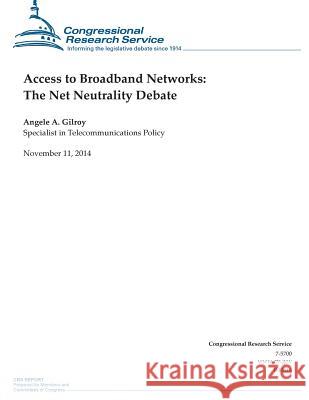Access to Broadband Networks: The Net Neutrality Debate » książka
Access to Broadband Networks: The Net Neutrality Debate
ISBN-13: 9781503272385 / Angielski / Miękka / 2014 / 26 str.
Access to Broadband Networks: The Net Neutrality Debate
ISBN-13: 9781503272385 / Angielski / Miękka / 2014 / 26 str.
(netto: 76,04 VAT: 5%)
Najniższa cena z 30 dni: 78,52
ok. 16-18 dni roboczych.
Darmowa dostawa!
As congressional policy makers continue to debate telecommunications reform, a major point of contention is the question of whether action is needed to ensure unfettered access to the Internet. The move to place restrictions on the owners of the networks that compose and provide access to the Internet, to ensure equal access and non-discriminatory treatment, is referred to as "net neutrality." While there is no single accepted definition of "net neutrality," most agree that any such definition should include the general principles that owners of the networks that compose and provide access to the Internet should not control how consumers lawfully use that network, and they should not be able to discriminate against content provider access to that network. A major focus in the debate is concern over whether it is necessary for policy makers to take steps to ensure access to the Internet for content, services, and applications providers, as well as consumers, and if so, what these steps should be. Some policy makers contend that more specific regulatory guidelines may be necessary to protect the marketplace from potential abuses which could threaten the net neutrality concept. Others contend that existing laws and policies are sufficient to deal with potential anti-competitive behavior and that additional regulations would have negative effects on the expansion and future development of the Internet. The January 2014 decision by the U.S. Court of Appeals, D.C. Circuit (Verizon Communications Inc. v. Federal Communications Commission, D.C. Cir., No.11-1355) upholding the Federal Communications Commission's (FCC) authority to use Section 706 of the Telecommunications Act of 1996 to regulate broadband providers, but striking down the specific anti blocking and nondiscrimination rules of the FCC's 2010 Open Internet Order has focused attention on the issue. Seven measures (H.R. 3982, H.R. 4070, H.R. 4752, H.R. 4880, H.R. 5429, S. 1981, and S. 2476) have been introduced in direct response to the January 2014 court decision, and subsequent FCC action. In response to the court remand the FCC on May 15, 2014, adopted a Notice of Proposed Rulemaking, to seek comment "on how best to protect and promote an open Internet." A consensus on the net neutrality issue has remained elusive. Some Members of Congress support FCC regulation of broadband providers, others feel that the regulation of the Internet is not only unnecessary, but harmful. The release on November 10, 2014, of a statement by President Obama, urging the FCC to adopt regulations to reclassify Internet access services as telecommunications services to be regulated under Title II of the 1934 Communications Act has once again focused attention on the debate. The FCC has yet to make a decision, but regardless of the outcome it is anticipated that the issue of access to broadband networks will be of continued interest to policy makers. The net neutrality issue has also been narrowly addressed within the context of the American Recovery and Reinvestment Act of 2009 (ARRA, P.L. 111-5). Provisions required the National Telecommunications and Information Administration (NTIA), in consultation with the FCC, to establish "nondiscrimination and network interconnection obligations" as a requirement for grant participants in the Broadband Technology Opportunities Program (BTOP). These obligations were released, July 1, 2009, in conjunction with the issuance of a notice of funds availability soliciting applications. Recipients of these awards have been selected and continued congressional oversight is expected.
Zawartość książki może nie spełniać oczekiwań – reklamacje nie obejmują treści, która mogła nie być redakcyjnie ani merytorycznie opracowana.











